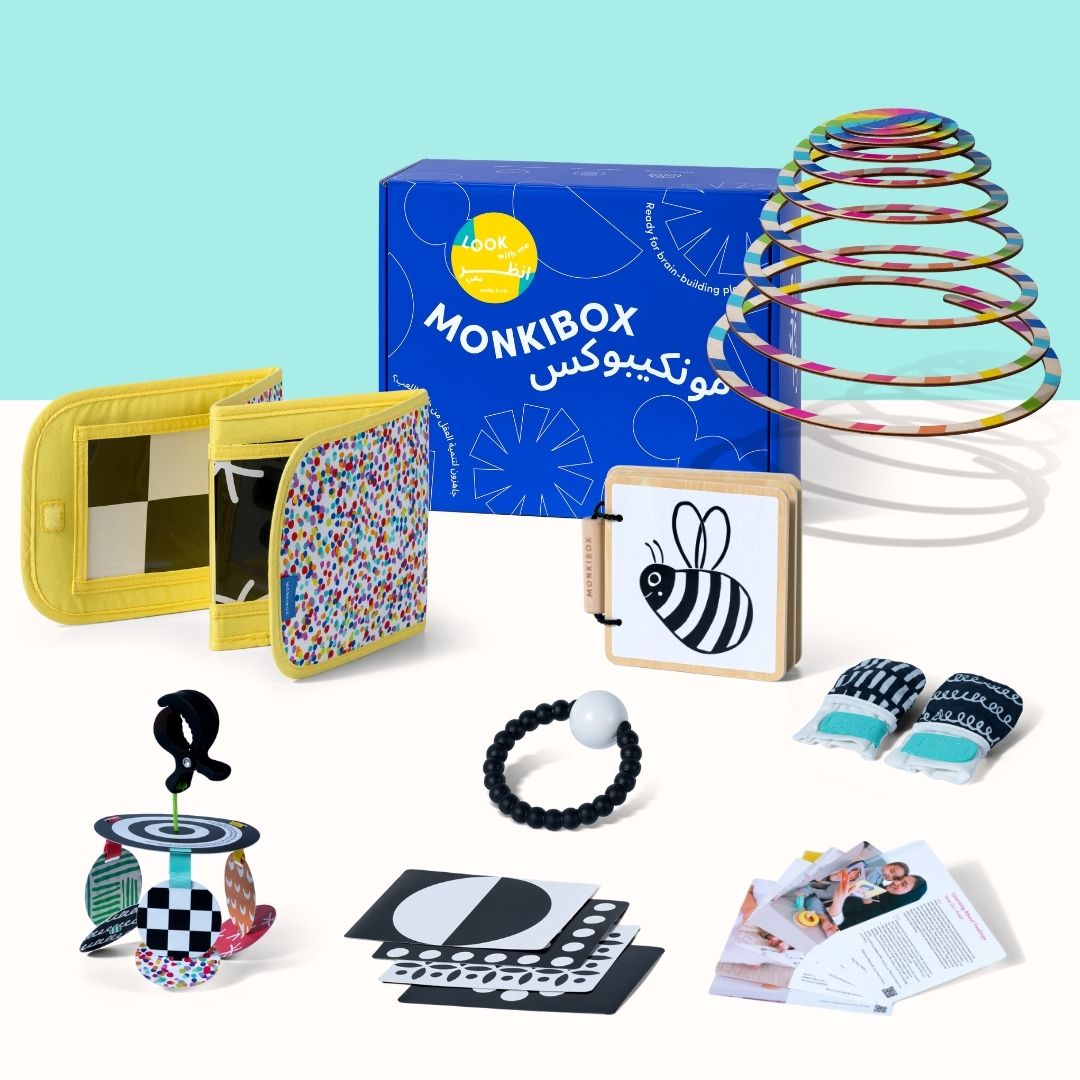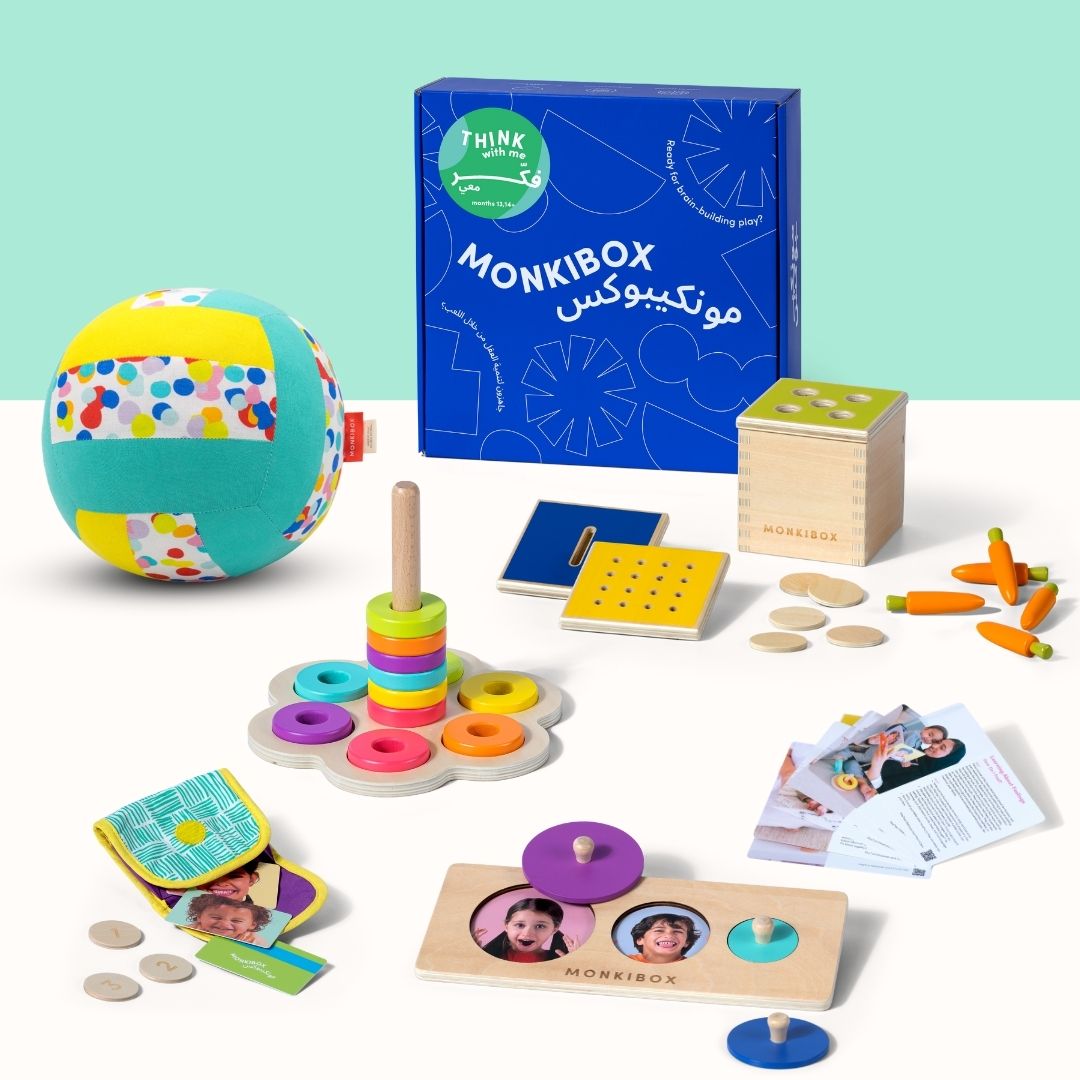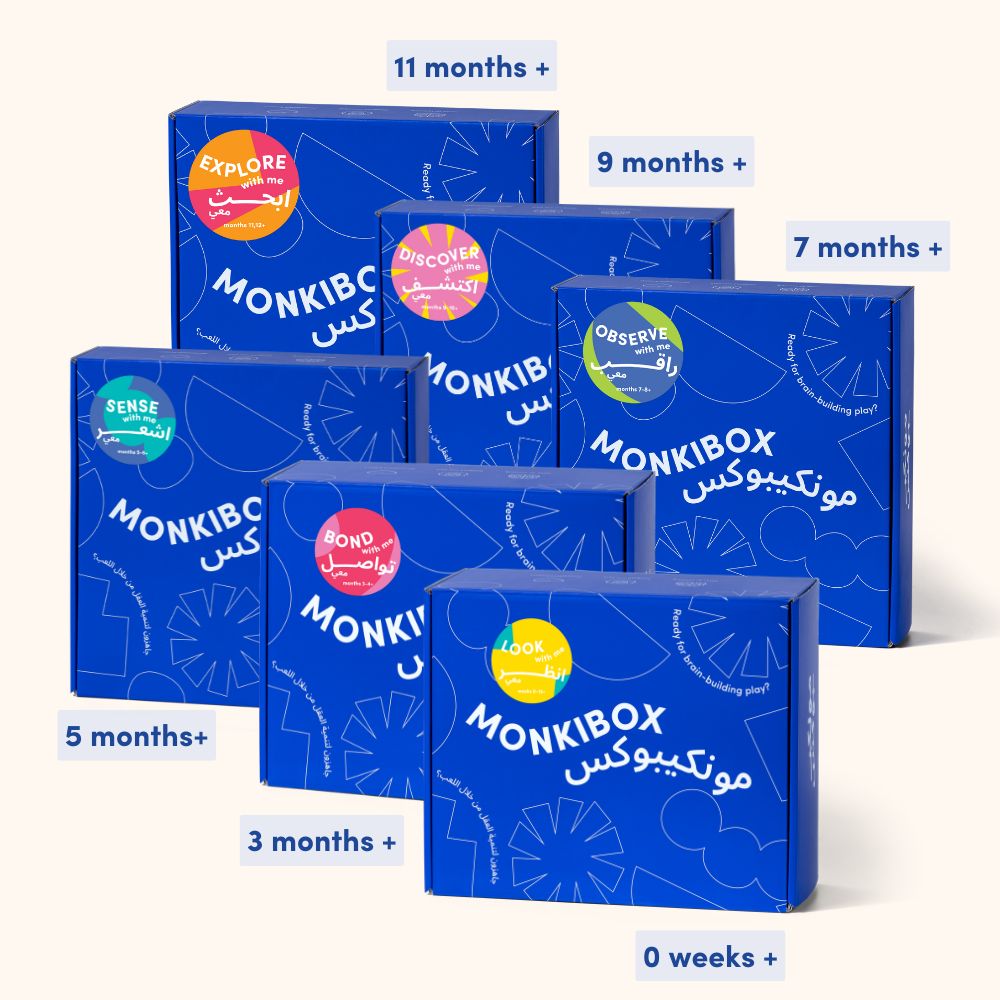Watching your little one grow is a magical journey — from their first smile to their first steps, every moment is pure wonder. Some milestones are big and unforgettable, others are quieter, like when your baby starts swaying to music or skillfully moving food with their tongue. At MonkiBox, we celebrate every moment, because each is a stepping stone in your child's incredible growth ❤️
Discover how MonkiBox Play Boxes are designed to nurture every milestone, right when your baby is ready for it.
What Are Baby Milestones?
Milestones are skills babies typically develop within a certain timeframe, guiding their physical, mental, social, and emotional growth. They fall into four key areas:
-
Motor Skills (gross and fine movements)
-
Cognitive Development (thinking, reasoning, learning)
-
Language & Communication (both understanding and expressing)
-
Social & Emotional Growth (connections, emotions, relationships)
Remember: Milestones are flexible. Every baby is unique, and the "right time" is different for each child. Some skills may appear earlier, some later, and a few might be skipped altogether. That's perfectly normal!
How Are Milestones Measured?
Development is a beautiful dance of small steps building up to big achievements. For example: before walking, babies learn to pull up, cruise along furniture, and balance.
Many milestones overlap. A baby's first smile is emotional and a motor skill! Growth is interconnected, and small wins lead to major breakthroughs.
Do All Babies Hit Milestones at the Same Time?
Short answer: No.
Every child has their own natural rhythm. Milestones give us helpful markers, but there's a wide range of "normal." If you ever feel unsure, your pediatrician can help guide you. Early support is powerful when needed.
Premature Babies and Milestones
If your baby arrived early (before 37 weeks), milestones are usually measured from their due date, not their birth date — what doctors call “adjusted age.” Most premature babies catch up to full-term development by around age two.
Your Baby's Month-by-Month Milestones
We’ve crafted a detailed look at what you might see as your little one grows. Remember, these are ranges — some babies will zoom ahead in one area and take their time in another.
1 Month Old
Motor Skills
-
Lifts head briefly during tummy time
-
Moves arms and legs with jerky motions
-
Turns head to the side when lying down
Cognitive Development
-
Stares at contrasting patterns or bold colors
-
Calms when comforted by a familiar voice
Language & Communication
-
Makes simple cries for hunger, discomfort, or tiredness
-
Begins to make "comfort" sounds
Social & Emotional
-
Momentarily establishes eye contact
-
Responds to being cuddled or rocked
2 Months Old
Motor Skills
-
Holds head steadier when picked up
-
Pushes up slightly during tummy time
-
Follows moving objects with eyes
Cognitive Development
-
Recognizes familiar people at a distance
-
Starts anticipating routines (feeding, diaper changes)
Language & Communication
-
Coos and gurgles
-
Smiles intentionally in response to interaction
Social & Emotional
-
Shows excitement when seeing caregivers
-
Enjoys being talked to and smiled at
3 Months Old
Motor Skills
-
Opens hands more often
-
Lifts chest and head with arm support
-
Begins swatting at toys
Cognitive Development
-
Watches faces with interest
-
Notices own hands and begins exploring
Language & Communication
-
Laughs out loud
-
Babbles more expressively
Social & Emotional
-
Smiles at reflection in a mirror
-
Starts recognizing familiar voices
4 Months Old
Motor Skills
-
Rolls from tummy to back
-
Reaches for and grasps toys
-
Brings hands to mouth
Cognitive Development
-
Notices cause-and-effect (shake a rattle = noise)
-
Looks for sources of sounds
Language & Communication
-
Babbles with different tones
-
Imitates some facial expressions
Social & Emotional
-
Shows pleasure through smiles and giggles
-
Enjoys playful interactions
5 Months Old
Motor Skills
-
Rolls from back to belly
-
Pushes up on extended arms
-
Brings feet to mouth
Cognitive Development
-
Explores objects with hands and mouth
-
Recognizes familiar faces vs. strangers
Language & Communication
-
Begins vocalizing excitement
-
Reacts to sounds with movements
Social & Emotional
-
Shows preference for primary caregivers
-
Enjoys mirror play
6 Months Old
Motor Skills
-
Sits with support
-
Rocks back and forth on hands and knees
-
Transfers objects between hands
Cognitive Development
-
Understands object permanence beginnings
-
Shows curiosity about surroundings
Language & Communication
-
Responds to own name
-
Begins "talking" during play
Social & Emotional
-
Recognizes own name
-
Shows joy at social games like peek-a-boo
7-8 Months Old
Motor Skills
-
Sits without support
-
Begins crawling or scooting
-
Grasps smaller objects using a "raking" motion
Cognitive Development
-
Explores toys with hands and mouth
-
Looks for hidden objects
Language & Communication
-
Babbles chains of sounds ("ba-ba-ba")
-
Responds to simple verbal cues
Social & Emotional
-
Develops stranger anxiety
-
Becomes more interactive during play
9-10 Months Old
Motor Skills
-
Pulls to stand
-
Cruises along furniture
-
Points with index finger
Cognitive Development
-
Engages in simple problem-solving
-
Follows basic gestures like pointing
Language & Communication
-
Understands simple phrases like "come here"
-
Imitates sounds and actions
Social & Emotional
-
Shows preference for certain people and toys
-
Enjoys interactive games like pat-a-cake
11-12 Months Old
Motor Skills
-
Stands alone for short periods
-
Takes first independent steps
-
Picks up tiny objects with thumb and finger (pincer grasp)
Cognitive Development
-
Tests limits and reactions (cause and effect)
-
Starts simple pretend play (feeding doll, brushing hair)
Language & Communication
-
Says "mama" or "dada" meaningfully
-
Uses simple gestures like waving "bye-bye"
Social & Emotional
-
Displays attachment to caregivers
-
Seeks comfort from familiar adults when upset
Unlock Your Child’s Potential — the Playful Way
MonkiBox Play Boxes are crafted by child development experts to spark joy and support your baby’s growth at every magical stage.
✨ Give your little one the best start. Explore our Play Boxes today.




